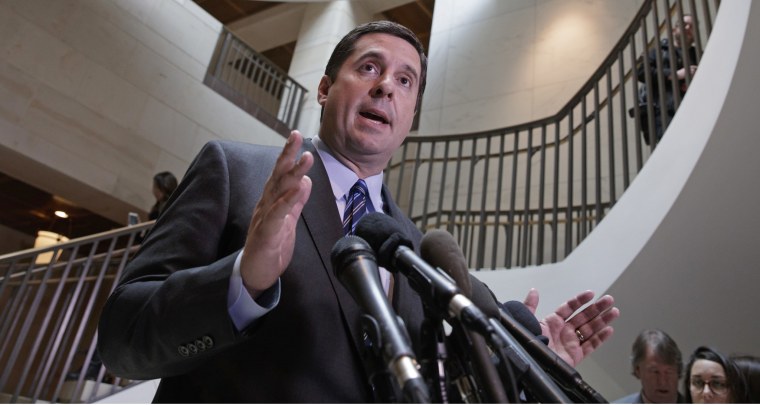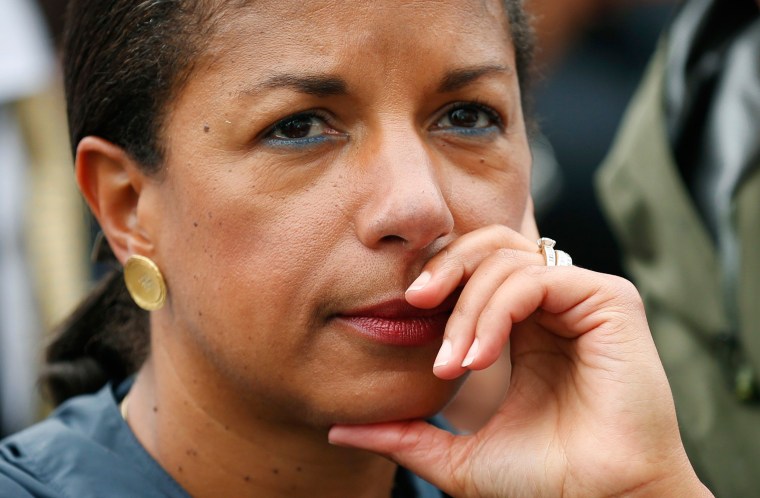A review of the surveillance material flagged by House Intelligence Committee Chairman Devin Nunes shows no inappropriate action by Susan Rice or any other Obama administration official, Republican and Democratic Congressional aides who have been briefed on the matter told NBC News.
President Donald Trump told the New York Times he believed former National Security Adviser Rice broke the law by asking for the identities of Trump aides who were mentioned in transcripts of U.S. surveillance of foreign targets. Normally, the identities of Americans are blacked out in transcripts circulated by the National Security Agency, but they may be "unmasked," if their identities are relevant to understanding the intelligence.
Rice did not dispute that she requested the identities of certain Americans in the waning days of the Obama administration, but she denied any wrongdoing in an interview with NBC News’ Andrea Mitchell. Her denial came after Nunes said he believed the names of Trump aides had been inappropriately unmasked and circulated.
Related: What Is Unmasking, And Did Susan Rice Do Anything Wrong?
Members of the House and Senate intelligence committees from both parties have traveled to NSA headquarters to review the relevant intelligence reports.
"I saw no evidence of any wrongdoing," said one U.S. official who reviewed the documents, who would not agree to be identified further. "It was all completely normal."

His assessment was shared by a senior Republican aide who had been briefed on the matter but declined to speak on the record.
The finding by lawmakers of both parties was first reported by CNN.
Nunes has recused himself from his committee’s investigation of Russian interference in the U.S. presidential election while the Office of Congressional Ethics investigates complaints that he disclosed classified information when he brought the unmasking concern to light.
When the New York Times asked Trump on April 5 if Rice broke the law, Trump said, "Do I think? Yes, I think."
"I think it's going to be the biggest story," Trump added. "It's such an important story for our country and the world."
Related: Nunes Backs Down From Assertion Trump Was Monitored
Sebastian Gorka, a Trump national security adviser, was asked by Sean Hannity on Fox News how the unmasking issue compared to Watergate.
"Losing 14 minutes of audiotape in comparison to this is a little spat in the sandbox in the kindergarten," Gorka replied.
But current and former U.S. intelligence officials have said that any unmasking request by Rice would have been made to the NSA director or the FBI director, who would have the final say. Both men are still in their jobs under President Trump.
Current and former officials say it is routine, and not inappropriate, for the national security adviser to request the identities of Americans mentioned in intelligence reports.
Related: Nunes Had Secret White House Meeting Before Trump Monitoring Claim
"Let's say there was a conversation between two foreigners about a conversation they were having with an American, who was proposing to sell to them high-tech bomb making equipment," Rice said April 4 on MSNBC’s Andrea Mitchell Reports. "Now, if that came to me as National Security Advisor, it would matter enormously. Is this some kook sitting in his living room communicating via the internet, offering to sell something he doesn't have? Or is it a serious person or company or entity with the ability to provide that technology perhaps to an adversary? That would be an example of a case where knowing who the U.S. person was, was necessary to assess the information."

